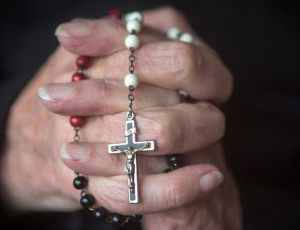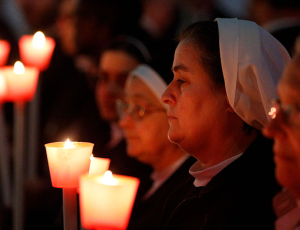‘I have come that they may have life and have it to the full’
‘I have come that they may have life and have it to the full’ (John 10:10)
I am convinced, after almost 65 years on this earth, that all of the problems impacting us in this world of ours derive from a single root cause: the failure to “respect life in all its stages, from conception to natural death.”
Abortion, euthanasia, capital punishment; acts of terror and war; escalating crime; violence and wanton killing of innocents; domestic and sexual abuse; drugs and gang crimes; the immigration crisis; poverty and inequality; discrimination and injustice; racism and hatred; breakdown of the family; blatant disregard for the environment — these are all “life issues” because they tear at the most basic obligation of every human: to respect life. Think about it for a moment.
Of all these failures to respect life, the United States Conference of Catholic Bishops have declared in their regular, pre-national election statement “Forming Consciences for Faithful Citizenship,”
The threat of abortion remains our preeminent priority because it directly attacks life itself, because it takes place within the sanctuary of the family, and because of the number of lives destroyed. At the same time, we cannot dismiss or ignore other serious threats to human life and dignity such as racism, the environmental crisis, poverty and the death penalty. Our efforts to protect the unborn remain as important as ever, for just as the Supreme Court may allow greater latitude for state laws restricting abortion, state legislators have passed statutes not only keeping abortion legal through all nine months of pregnancy but opening the door to infanticide. Additionally, abortion contaminates many other important issues by being inserted into legislation regarding immigration, care for the poor, and health care reform.
… Human life is sacred. The dignity of the human person is the foundation of a moral vision for society. Direct attacks on innocent persons are never morally acceptable, at any stage or in any condition. In our society, human life is especially under direct attack from abortion, which some political actors mischaracterize as an issue of “women’s health.” Other direct threats to the sanctity of human life include euthanasia and assisted suicide (sometimes falsely labelled as “death with dignity”), human cloning, in vitro fertilization, and the destruction of human embryos for research.
The Vatican Congregation for the Doctrine of Faith recently released a letter addressing another assault on life, euthanasia and assisted suicide, in which the CDF states
Euthanasia, therefore, is an intrinsically evil act, in every situation or circumstance. In the past the Church has already affirmed in a definitive way “that euthanasia is a grave violation of the Law of God, since it is the deliberate and morally unacceptable killing of a human person. This doctrine is based upon the natural law and upon the written Word of God, is transmitted by the Church’s Tradition and taught by the ordinary and universal Magisterium. Depending on the circumstances, this practice involves the malice proper to suicide or murder.” Any formal or immediate material cooperation in such an act is a grave sin against human life: “No authority can legitimately recommend or permit such an action. For it is a question of the violation of the divine law, an offense against the dignity of the human person, a crime against life, and an attack on humanity.”
October is “Respect Life Month” in the Catholic Church in the United States. Beginning on the weekend of October 3-4, all Catholics are called to celebrate our Church’s commitment to respect life in all its stages. Taking as our theme “Live the Gospel of Life,” the Church invites us all to consider every means at our disposal to advocate on behalf of every human life.
To believe in God as Creator requires that we must believe that God is the author of life, all life, every life. It is not merely the logical conclusion of that belief: it is the only conclusion. And if that is what we believe; if that is the only conclusion that we can derive from our common human experience, how can anyone reasonably not respect life in all its stages?
Even those who do not believe in God as Creator have to admit that respect and care for life must be the thing that differentiates us, as human beings, from everything else that exists. The survival of the human species depends on it. It is not only a religious conviction, and it is certainly that. Respect for life is a profoundly human conviction, a dictate of human reason that, when joined to religious faith, elevates respect for life to the level of what is truly sacred about human existence.
One need not be a philosopher or theologian or even particularly intellectual to draw this conclusion. One need only to open one’s eyes, to draw a breath, to get out of bed in the morning, to hear another’s voice, to grasp another’s hand, to love another to know that life is worth living and a gift to be cherished.
And if one is not able to see or to breathe easily or to get out of bed or to hear or to grasp — for some reason known only to God our Creator —to love and to be loved is still possible and defines the purpose of our existence in this world.
Even God himself chose to take on flesh in Jesus Christ, to be born, to be loved by his family, to grow, to laugh, to cry, to make friends, to feel loneliness, to be understood by some and misunderstood by others, to be happy, to be sad, to give himself to others, to suffer for them out of love — in essence, to be fully human while fully divine — and in all of this, to show that human life is sacred, a gift of God, and worthy of respect without exception from conception until natural death.
We who follow Jesus Christ, the Lord of Life, cannot do otherwise than respect life in all its stages. To do less, regardless of any circumstance or situation that we can conceive of or experience, is to be less human, rejecting what God has created, rejecting what Jesus has redeemed in his own human body, rejecting what the Holy Spirit has sustained. On this earth, only the human being can truly respect life and know what that means and requires.
There is no other human choice but to do this.




